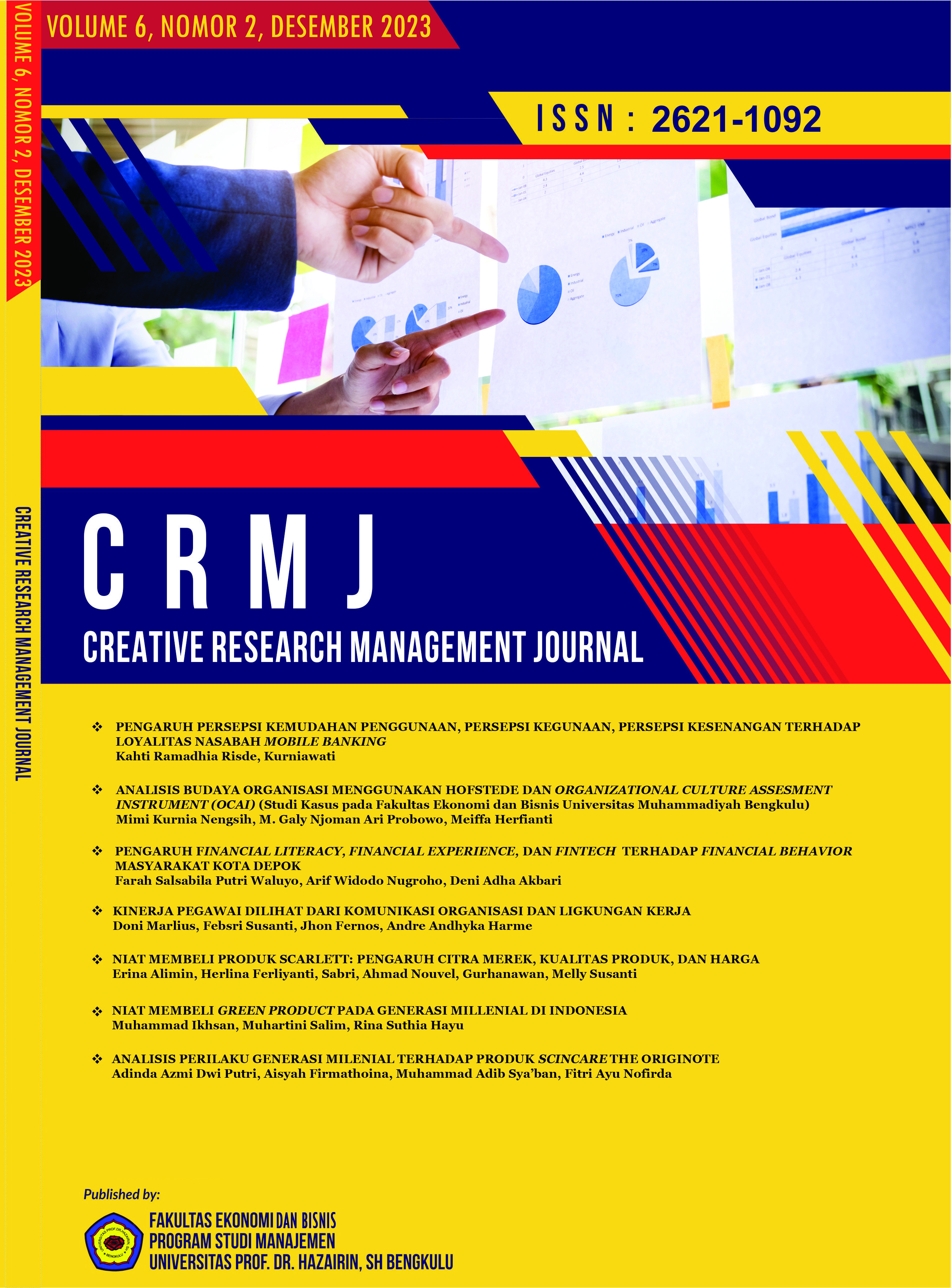ANALISIS BUDAYA ORGANISASI MENGGUNAKAN HOFSTEDE DAN ORGANIZATIONAL CULTURE ASSESSMENT INSTRUMENT (OCAI)(Studi Kasus pada Fakultas Ekonomi Dan Bisnis Universitas Muhammadiyah Bengkulu)
DOI:
https://doi.org/10.32663/0c114m09Kata Kunci:
Budaya Organisasi, Hofstede, Instrumen Penilaian Budaya OrganisasiAbstrak
Organizational culture affects a person's role in carrying out his role. The success of organizational culture is marked by changes in individual behavior that can be emulated by other individuals. This study aims to determine the organizational culture created in the Faculty of Economics and Business, University of Muhammadiyah Bengkulu. The method used in analyzing organizational culture is Hofstede's method and OCAI (Organizational Culture Assessment Instrument) analysis. The results of the analysis using Hofstede's cultural dimensions state that the Faculty of Economics and Business, Muhammadiyah University of Bengkulu is in an organizational culture that has an even distribution of power, is collectivistic, masculinity has a strong influence within the institution, the institution focuses on things that have certainty value, the institution concentrate more on matters that have a long-term, future-oriented nature, and implement pragmatic values and institutions that control the fulfillment of needs and regulations with strict social norms. Meanwhile, based on the OCAI analysis, the current organizational culture and the expected organizational culture in the future is the Clan organizational culture. This means that there is a match between the desires of the leadership and employees because they are in the same organizational cultural orientation, namely a friendly workplace where people share with each other like a big family.
Referensi
Arda, D. (2016). Perbandingan konsep nilai budaya dengan menggunakan kerangka kerja hofstede. 1–23.
Asih, A. Y. P., Setianto, B., & Adriansyah, A. A. (2021). Analisis Budaya Organizational Culture Assesment Instrument (OCAI) pada Pejabat Struktural di RS Islam Surabaya. Jurnal Kesehatan Vokasional, 6(4), 200. https://doi.org/10.22146/jkesvo.70295
Assoratgoon, W., & Kantabutra, S. (2023). Toward a sustainability organizational culture model. Journal of Cleaner Production, 400(March), 136666. https://doi.org/10.1016/j.jclepro.2023.136666
Belias, D., Koustelios, A., Vairaktarakis, G., & Sdrolias, L. (2015). Organizational Culture and Job Satisfaction of Greek Banking Institutions. Procedia - Social and Behavioral Sciences, 175(January 2018), 314–323. https://doi.org/10.1016/j.sbspro.2015.01.1206
Briody, E. K., Berger, E. J., Wirtz, E., Ramos, A., Guruprasad, G., & Morrison, E. F. (2018). Ritual as work strategy: A window into organizational culture. Human Organization, 77(3), 189–201. https://doi.org/10.17730/0018-7259.77.3.189
Canning, E. A., Murphy, M. C., Emerson, K. T. U., Chatman, J. A., Dweck, C. S., & Kray, L. J. (2020). Cultures of Genius at Work: Organizational Mindsets Predict Cultural Norms, Trust, and Commitment. Personality and Social Psychology Bulletin, 46(4), 626–642. https://doi.org/10.1177/0146167219872473
Dasgupta, S., & Gupta, B. (2019). Espoused organizational culture values as antecedents of internet technology adoption in an emerging economy. Information and Management, 56(6), 103142. https://doi.org/10.1016/j.im.2019.01.004
Fanya, B., Kadiyono, A. L., & Ashriyana, R. (2021). Analisis Budaya Organisasi Menggunakan Organizational Culture Assessment Instrument (OCAI) pada PT. X. MUKADIMAH: Jurnal Pendidikan, Sejarah, Dan Ilmu-Ilmu Sosial, 5(1), 63–69. https://doi.org/10.30743/mkd.v5i1.3450
Geert Hofstede, & Minkov, M. (2013). Values survey maodule 2013 manual. May, 17.
Hofstede, G. (2011). Dimensionalizing Cultures. Online Readings in Psychology and Culture, 2(1), 1–26.
Hofstede, G.J.Hofstede, & M.Minkov. (2010). Cultures and organizations Software of the mind. In Mc Graw Hill (Issue 5671).
Naqshbandi, M. M., & Tabche, I. (2018). The interplay of leadership, absorptive capacity, and organizational learning culture in open innovation: Testing a moderated mediation model. Technological Forecasting and Social Change, 133(April), 156–167. https://doi.org/10.1016/j.techfore.2018.03.017
Putra, I. A. G. S. (2017). Analisis Budaya Organisasi Menggunakan Model OCAI (Organizational Culture Assessment Instrument) pada Universitas XYZ. Konferensi Nasional Sistem & Informatika, 452–457.
Rangkuti, F. (2016). Teknik Membedah Kasus Bisnis Analisis SWOT (Dua Puluh). Gramedia.
Setyaningrum, R., Wijaya, A. R., & Subagyo, S. (2022). The Characteristics of Society in Indonesian Based on the Hofstede Cultural Dimensions: Measuring the Five Indonesian Island. International Journal of Cultural and Art Studies, 6(1), 60–74. https://doi.org/10.32734/ijcas.v6i1.8720
Sharma, S., & Aparicio, E. (2022). Organizational and team culture as antecedents of protection motivation among IT employees. Computers and Security, 120. https://doi.org/10.1016/j.cose.2022.102774
Sihombing, O. S., & Pongtuluran D., F. (2013). Pengidentifikasian Dimensi-dimensi Budaya Indonesia: Pengembangan Skala dan Validasi. Journal of. Internet Banking and Commerce, 1–16.
Siregar, A. Z., Tulus, & Hastuti, L. D. S. (2019). Potential Tempe Product of Universitas Sumatra Utara in Supporting Food Security in North of Sumatera, Indonesia. In IOP Conference Series: Earth and Environmental Science (Vol. 347, Issue 1). https://doi.org/10.1088/1755-1315/347/1/012076
Siregar, L. N., Mayadewi, R. P., & Rosely, E. (2016). Penilaian Budaya Organisasi Perguruan Tinggi Menggunakan Values Survey Module 2013 Hofstede Di Universitas Telkom Bandung. Seminat Nasional Sistem Informasi Indonesia, November, 1–11. https://www.researchgate.net/publication/312344823
Trioctavia, J., Hamid, D., & Mukzam, M. (2016). Peranan Pemimpin Dalam Mengembangkan Budaya Organisasi (Studi Kasus Pada Pt. Asuransi Jiwasraya (Persero) Malang Regional Office). Jurnal Administrasi Bisnis S1 Universitas Brawijaya, 40(1), 150–159.
Umartias. (2014). Menggunakan Organizational Culture Assessment Instrument ( Ocai ) Pada Pt Bandeng Juwana Elrina. Fakultas Ekonomika Dan Bisnis.
Wellem, I. (2019). Analisis Budaya Organisasi dengan Menggunakan Metode Organizational Culture Assessment Instrument (Ocai) Pada Perusahaan Daerah Air Minum (PDAM) Kabupaten Sikka. Jurnal Projemen UNIPA Maumere, 6(1), 1–22.
Wijayani, T. R. A., Utami, S., & Witcahyo, E. (2014). Hubungan Antara Profil Budaya Organisasi (Menggunakan Pendekatan Competing Values Framework) dengan Kinerja Organisasi Puskesmas di Kabupaten Jember …. Pustaka Kesehatan, 2(2). http://jurnal.unej.ac.id/index.php/JPK/article/view/1789
Unduhan
Diterbitkan
Terbitan
Bagian
Lisensi
Hak Cipta (c) 2023 Meiffa Herfianti, Mimi Kurnia Nengsih, M. Galy Njoman Ari Pribowo

Artikel ini berlisensi Creative Commons Attribution 4.0 International License.





